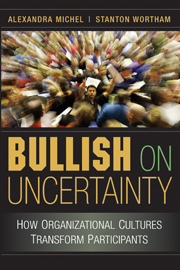Book contents
3 - Practices That Amplified Cognitive Uncertainty at Organization Bank
Published online by Cambridge University Press: 10 January 2011
Summary
Organization Bank took a different approach to managing cognitive uncertainty. When asked the same open-ended question about factors that were critical for a bank's performance, Organization Bankers said that banks fail when “people think of themselves as experts and don't realize that their knowledge doesn't apply to a new situation,” that “bankers develop these recipes for how to do things and forget that each situation is different,” and that “people put too much faith into what they think to be true.” Out of forty-two senior bankers interviewed, thirty-seven made reference to practices that involve uncertainty amplification. They said that banks succeed when they “continuously remind people of how little they know” and “create the ‘insecure overachiever,’ someone who compulsively doubts what they know all the time.” Because Organization Bank believed that general concepts could encourage a dangerous sense of cognitive certainty, it discouraged the abstract strategies, roles, and criteria that were encouraged at Individual Bank. Furthermore, Organization Bank actively created cognitive uncertainty, counteracting people's tendency to rely on abstract concepts by forcing bankers to attend to a broad range of concrete information and denying them abstract concepts to organize that information. None of the Individual Bankers mentioned anything resembling cognitive uncertainty amplification in their responses, and none of the Organization Bankers mentioned anything like cognitive uncertainty reduction.
This chapter describes how Organization Bank implemented its counterintuitive program of cognitive uncertainty amplification, exploring the same five practices of strategy formulation, role definition, training, staffing, and feedback.
Information
- Type
- Chapter
- Information
- Bullish on UncertaintyHow Organizational Cultures Transform Participants, pp. 61 - 92Publisher: Cambridge University PressPrint publication year: 2008
